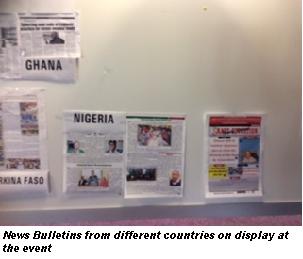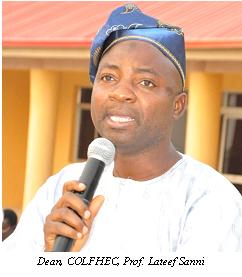The University has received another accolade in faraway Geneva, Switzerland, during the 38th Session of the Codex Alimentarius Commission (CAC), as part of activities marking the World Health Day celebration.
Commending the University, the Deputy Director, Standards Organisation of Nigeria (SON), Mrs. Margaret Eshiett, disclosed that Nigeria was recognised as one of the countries that celebrated the World Health Day because CAC, in the course of reviewing the news publications of the various countries that celebrated the last World Health Day, appreciated the one organised by the College of Food Science and Human Ecology (COLFHEC), as reported in the weekly FUNAAB Bulletin, while applauding the University for being proactive. 
Reacting to the development, the Dean of COLFHEC, Professor Lateef Sanni, described the feat as “a very good landmark success story, a leveraging opportunity for our University and it is a combination of collective efforts, not only by the technical team in our College, but also that of the Directorate of Public Relations ofthe University”, stressing the need for Colleges and his professional colleagues to leverage opportunities in their areas of specialisation with a view of creating global relevance for the University.
The Dean, who is the immediate past President, Nigerian Institute of Food Science and Technology (NIFST) and currently the Chairman of NIFST Foundation, said “already, our Department, Food Science and Technology, if it’s not number one, we should be at least number three in Nigeria. My dream is for the College to be in the forefront of innovations, global relevance, excellence and productivity. So, it is going to enhance more of our innovations”. The University Don revealed that COLFHEC had just completed an international training workshop on “Food Safety and Nutrition”, while another international conference on “Food Science and Human Ecology”, would hold in July, next year.
On how the country intends to mitigate the challenges of food security, Professor Sanni suggested that Nigerians should embrace and support the implementation of the current government’s policy on the expansion of the local production of agricultural products. “For us to be able to be food secured, food must be available, it must be affordable and it must be accessible and if we do not have that, then we are far from the point. Presently, the availability of the food is limited because we are unable to add value to the food and we are equally unable to preserve the food. For instance, for maize, after the raining season, we allow it to dry up but if there are no silos to store most of them, the food value of the maize would be lost and the same thing with other food products”.
He challenged Nigerians to invest in the Federal Government’s Agricultural Transformational Agenda. “I am not talking to the government. Government’s role should be that of a catalyst; a champion to provide viable environment, electricity supply, road network and security. That is the role of government and instead of a federal ministry to budget huge sums of money, those budgeting could be leveraged on the banks to give single digits interest rate to the private sector to develop agriculture, water system while the government can use the remaining money to expand physical facilities, as these facilities will ensure that we are food and nutrition-secured in Nigeria”.
Professor Sanni advised that the private sector should be allowed to drive the commodity value chain system, while the government should work seriously to ensure that there was consistent power supply, very viable road network and security in the country. Professor Sanni, who is also the President, International Society for Tropical Root Crops, African Branch, promised that he would continue to champion the course of Food Science and Technology.
The Codex Alimentarius Commission is a joint inter-governmental body of the World Health Organisation (WHO) and the Food and Agricultural Organisation (FAO) of the United Nations, comprising 185 countries and the European Union. The commission meets annually to compile the standards, codes of practice, guidelines and recommendations that protect consumer health and ensure fair practices in food trade.
